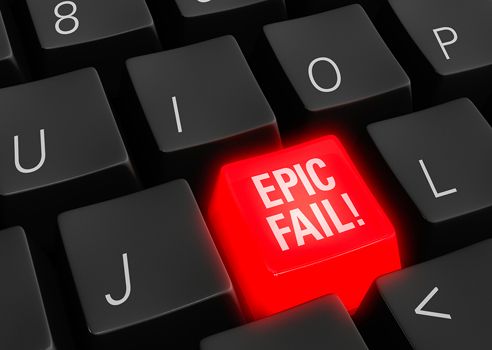Reading time: Less than 3 minutes
“Fail” is one of the most dreaded four-letter words. But it shouldn’t be! Here’s why you should overcome the fear of writing failure…
When I worked in daily newspapers, in the early 1980s, I wrote and edited my stories on a computer. This was shortly before desktop computers were an item you could buy in a store, so we all knew we were pretty cool….
Anyway, I had to apply a coding to everything I edited. I can no longer remember exactly how I did it but my job involved something a bit like HTML coding today. You know: I had to put <HEL 48> before a headline that I wanted to be 48 pt. Helvetica and </HEL 48> after, when I wanted to stop the headline and return to regular body type.
One day, I sent a long story for typesetting, just before the deadline. The trouble? I forgot to add the concluding code. As a result, the entire, very long story was in 48 pt. type. It took about 10 minutes to typeset, made the newspaper late and wasted a lot of expensive phototypesetting paper.
My boss, who didn’t usually like me, was surprisingly good-humoured about it. “You’re producing some interesting wallpaper out back,” he said. “Oh, and there’s a posse of guys looking for your scalp.”
I had made a mistake. A pretty bad one. But I didn’t get fired. Or even reprimanded. I think everyone knew I’d beat myself up enough for it. And I’d never do it again.
A few months later, I experienced another, more writerly failure. This one was with one of my reporters, a junior writer. Assigned to review a dance performance she had used a metaphor in which she compared the dance to a plate of spaghetti.
I called her over to my computer later that day and complimented her on presenting a metaphor. Then I asked her what it meant. “I was trying to say the performance was confused – in the same way that noodles and sauce are all jumbled together,” she said. She paused before adding, “It didn’t really work, did it?”
I confirmed that it didn’t and again congratulated her again on making the effort. Then we had a good discussion about how to use figurative language in a way that really works.
My boss would have had conniptions if he’d heard me congratulating her, but I’m a big believer in making mistakes. This is because mistakes show you’re pushing yourself. You’re trying to learn new things. You’re trying to get better at what you do.
Psychologists know that even high profile mistakes — lightweight: Jennifer Lawrence tripping at the Oscars; serious: President John F. Kennedy and the Bay of Pigs — can make people seem more likeable. This is a result of the so-called “pratfall effect.” When someone we see as competent makes a mistake, we often like that person more because it shows they are human, too.
Anjali Sastry, a lecturer at the MIT Sloan School of Management and Harvard Medical School, has even written a book about the subject of mistakes. It’s called Fail Better: Design Smart Mistakes and Succeed Sooner. In it, she presents three steps for failing better:
- Launch every innovation project with the right groundwork
- Build and refine ideas and products through iterative action
- Identify and embed the learning
I think the most important one is #3: learn more. Failure is part of the human condition. (And, of course, the writer’s condition as well.) Nothing we do is ever going to be perfect. So if we can learn from our mistakes, we’re doing well.
So many writers suffer from so much fear they become terrified to put words on the page. In no way does this help them. It only hinders them from producing their crappy first draft.
Of course there are a few people in society we don’t want making mistakes. I’d put surgeons, airplane pilots and nuclear plant technicians on that list. But writers? Writers?
I’m not saying writers should be either careless or thoughtless. Of course we need to be careful and diligent in our work. (Particularly at the research end. Get the facts right!) But I’m also saying we need to be unafraid to try new things. Get outside of our comfort zones. Push ourselves to write in different ways and faster.
If we’re not making at least a few mistakes we’re probably not producing nearly enough work.
Do you embrace failure or avoid it? We can all learn from each other so, please, share your thoughts with my readers and me in the “comments” section, below. And congratulations to Charli Mills, the winner of this month’s book prize, If You Want to Write by Brenda Ueland for her July 21 comment on my blog. Anyone who comments on today’s post (or any others) by August 31/15 will be put in a draw for a copy of a lovely book of essays on writing, Swallowing the Sea, by Lee Upton. To leave your own comment, please, scroll down to the section, directly underneath the “more from my site” links, below.


